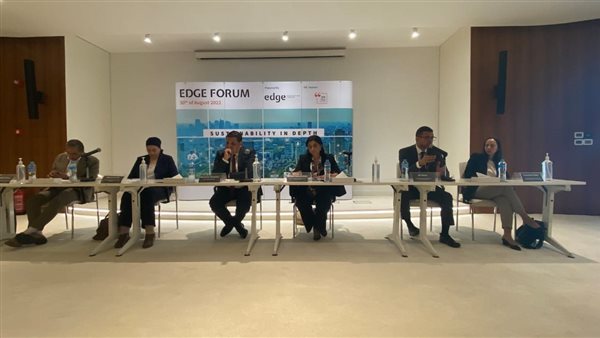Dr. Khaled Fahmy, the former Minister of Environment, revealed several challenges facing the Egyptian state, which will organize the climate summit in Sharm el-Sheikh next November, noting that the state of international division caused by the Russian-Ukrainian crisis and the global economic crisis represents a challenge to the summit hosted by Egypt.
This came during a seminar organized by the Edge Innovation Center, affiliated with Raya Smart Building Company – one of Raya Holding Companies for Financial Investments, entitled “Sustainability and Future Plans”, which was moderated by Mr. Saber Othman, Chairman of the Board of Trustees of Climate Our Earth Foundation for Sustainable Development and former coordinator of the United Nations Framework Convention to Climate Change, to highlight the efforts of the Egyptian state in hosting the COP27 Climate Change Conference, and how the private sector contributes to cooperating with the government to make the summit a success and achieve sustainability in various fields, and the role of civil society in the issue of climate change, which comes within the efforts of the EDGE Center to spread awareness of sustainability.
He drew Dr. Khaled Fahmy during his speech that climate change is a cross-border phenomenon and an economic and political crisis that requires a lot of negotiations to reach a compromise formula, stressing that there are great hopes held at the Sharm el-Sheikh summit, and for a period of thirteen days, during which Egypt hosts world leaders and leaders, and the delegations accompanying them, and it is an event It has significance, starting with Egypt’s hosting of it, up to the expected benefits of the conference for developing countries, especially African ones.
Fahmy stressed that the countries of the world have made pledges to reduce carbon emissions, but few of them have committed to developing executive plans to confront this dangerous phenomenon, noting that it did not exceed only 60% of the hoped-for effort, while it remains to reach the dangerous stage of increasing the temperature of the earth. 1.5 degrees Celsius, noting that among the five most important risks facing the world in the coming period, containment and adaptation to climate change comes first in terms of impact and probability of occurrence during the next ten years.
Fahmy stressed that the challenge facing developing countries’ implementation of clean growth policies is the challenges of financing, due to the lack of solvency, for most of these countries to receive international financing in the form of loans, and demanded the need for new financing policies, in order not to increase the financial challenges of developing countries, and to encourage them to engage with international efforts.
Fahmy warned against the attempt of developed countries to evade their financing pledges regarding climate change, noting that a large number of them confirmed that their participation in financing sustainability issues would be 25% government funding, and the rest for activities related to the private sector, not from the state itself, stressing the need to stimulate the sector The private sector will not participate unless it finds facilities to benefit from it.
For her part, Maysoon Ali, Head of Sustainability, Environmental and Social Management Systems at CIB, stressed that the bank aims to achieve sustainable development in Egypt and push the wheel towards a green economy to face future risks.
Maysoon explained that the bank aims to integrate financing solutions with environmental and social standards and government principles to achieve Egypt’s 2030 strategy, noting that the bank has established principles of sustainability and encouragement of green investments, which has contributed to a complete qualitative shift within the bank.
Maysoon added that the Egyptian banking sector has a tangible role in supporting sustainable development, noting that the Central Bank of Egypt has confirmed in a statement that the trend towards sustainable financing in the banking sector has become one of its priorities within the efforts made to build and increase capacities to confront environmental and social challenges, stressing that sustainable financing It reinforces its commitment to support the national trend to achieve the sustainable development goals.
She pointed out that the Commercial International Bank presented several green financing programs during the forum, which seek to serve customers to finance industrial pollution control, new and renewable energy, agricultural projects and related services and industries, and the green economy financing program.
Maysoon stressed that achieving sustainable development requires the concerted efforts of all private sector institutions, calling for the need to raise awareness among small investors of the necessity of integrating the environmental and societal dimension of projects to accelerate the transformation process towards a green economy.
Yasmine Saqr, director of the Department of Social Responsibility and Sustainability at Raya Company, explained that achieving sustainable development is a shared responsibility between bodies, governments and individuals, and no single party can achieve this alone. Equipping it to be environmentally friendly and take into account the objectives of sustainability.
She added that the company established the first solid waste factory in Egypt and it has now become one of the largest factories in the Middle East, and we have many industries in which we seek to implement sustainability, such as automotive and electronic payment, in addition to the afforestation projects that we are undertaking.

